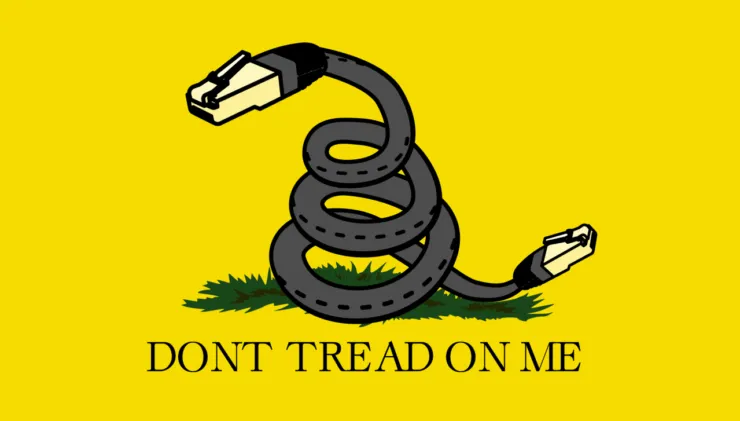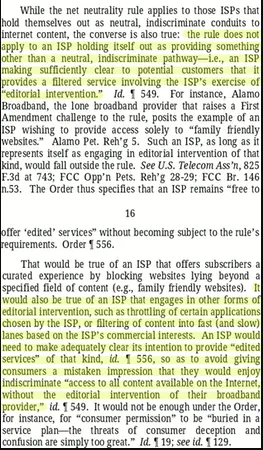While it has yet to get through a final senate vote, Net Neutrality is very nearly dead. Polls show (not that you should trust polls) that the "majority of Americans" support Net Neutrality. This is due, in great part, to disinformation campaigns and poor understanding of basic economics, regulation and Net Neutrality itself. There are a few myths and misconceptions that should be cleared up before analysing anything.

Myth #1: Net Neutrality keeps the internet free
This is the biggest myth and it is very easy to understand why this is false.
- Net Neutrality is a regulation
- The government must enforce regulations with various means
- Enforcing a regulation is necessarily a restriction of freedom
- Therefore, Net Neutrality is the restriction of freedom
Leaving the internet in the hands of ISPs is not the antithesis of freedom. In fact, you could start up your own ISP and provide internet. That means that a lack of government regulation on the internet leads to more freedom because anyone has the legal ability to start up their own ISP.
Myth #2: Regulating monopolies won't harm small ISPs
The reality is the exact opposite of this. Every regulation has its loopholes. Many regulations were built intentionally with loopholes. It's very difficult for a normal person to find and make use of these loopholes, but the monopolistic companies have strong legal teams to find their way around regulation. Small businesses do not have these resources and so they are burdened with necessarily higher costs. The notion that there are small ISPs that are legitimately in favour of Net Neutrality is laughable. Only an idiot would want to pay more to make no additional profit. It's a simple marketing tactic to gain public favour. It's impossible to know how many startup ISPs had to shut down or could never exist in the first place due to the regulations, but any decrease in the incentive to start up a new ISP is a bad thing for the industry, and bad for consumers.
Myth #3: Net Neutrality doesn't hamper innovation
This is simply bad economics. There is a list of small ISPs claiming they haven't reduced innovation due to Net Neutrality, but this is impossible to know. Perhaps if they lower costs they would have more resources to operate. The list of ISPs is not a good argument because there would be a large number of ISPs who have had innovation hampered as well. An increase in costs necessarily reduces a company's resources. A reduction in resources reduces the chances of innovation. In the unrealistic best case scenario where there has been no less innovation, the chance of innovation still decreases. This is a bad thing.
Basic Economics: Regulations decrease welfare

I quickly drew up the above graph to demonstrate how an increase in cost for the ISP will decrease welfare. As you can see, when the supply increases from the black to the blue as a result of regulation, the quantity (internet available) will necessarily decrease and the price will necessarily increase. This is just a hypothetical with no prices attached because it's impossible to determine exactly how the market will change, but there's no doubting that under Net Neutrality, the internet would have more limited physical and non-physical access and more expensive access. Net Neutrality does not have a Get Out of Jail Free pass when it comes to basic economic principles so the same rules would apply.
Details about Net Neutrality: The Doomsday Scenario was always legal
It was found that the worries that ISPs would throttle internet were unfounded since it was always legal. Net Neutrality, in all its greatness at "protecting freedom" did not legally prohibit the throttling of internet.

If you read the above section of Net Neutrality you will notice the words "sufficiently clear" and "adequately clear". In legal terms, this means that it needs to be part of the written contract, even if it's fine print on page 872 of 1005. You never need to actually see the term with your own eyes if you've signed the contract.
Under Net Neutrality, did the monopolies constantly throttle internet? No. It was perfectly legal for them to do so, and they chose not to. Without Net Neutrality there is no reason to believe they will do anything differently because it's incredibly bad PR. When Comcast and Netflix had their bout, it was bad PR for Comcast, despite them doing nothing wrong and the "throttling" being due to a bottleneck with the intermediary between Netflix and Comcast which was caused by the disproportionately large amount of traffic and data usage that Netflix has.
Net Neutrality was a massive power grab
There was an excellent post on Reddit about how Obama took control of the internet without anyone noticing, which has been archived here. This post briefly goes over the history of the internet and the government attempting to regulate it. The most notable power grab was the Countering Information Warfare Act 2016. As Title II entities, the government could refuse to renew, or cancel, an ISP's broadcasting license at any time. This coupled with the Countering Information Warfare Act meant that the government could use a third party "fact checking" website like Snopes, which was been thoroughly dissected and is not a reliable site, could advise the established "interagency center" to force the removal of certain websites and threaten to not renew, or cancel, the broadcasting license of an ISP.
This would give the president direct control over the internet, a power which no single man should have.
Net Neutrality was one of the biggest scams in recent history
Net Neutrality was bad economics which reduced the welfare of society. It did not stop the ability of monopolies to throttle the internet. It gave the president control over the internet when coupled with the Countering Information Act 2016.
Net Neutrality was never:
- Pro-consumer
- Pro-freedom
- Economically logical
- Able to harm monopolies
The mass disinformation campaigns made it seem like a positive thing, but there was nothing positive about it. Don't blindly put your trust in regulations and laws with nice names. There was nothing patriotic about the Patriot Act and there's nothing neutral about Net Neutrality.